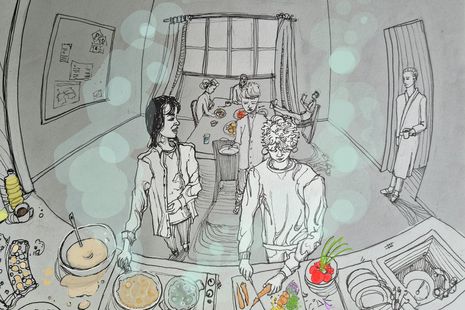Head-to-head: eating in hall or cooking?
Olivia Redman roots for buttery food while Janella Scott defends the simple home-cooked meal

Olivia
Ah, yes. Caff. The Buttery. Trough. Slops. Whatever bizarre nickname your college affectionately uses to refer to hall food, you can’t deny that there’s something appealing about eating in college. I personally love cooking, and I actually prefer making my own food if I have the time and space – not to brag, but I make a mean chicken chasseur.
The problem with cooking at Cambridge, of course, is time and space. I have pretty high contact hours, which means that, if I want to eat something more complex than pasta, I need to find time to go out, buy ingredients, cook a meal, eat that meal, and then wash up afterwards. That’s time I usually don’t have. My college also doesn’t have great kitchen facilities; the gyps in the first-year Wolfson Building are shared between five people and are absolutely tiny, with room for about one person to cook food, or maybe two people to stand and gossip. Some courts don’t have stoves, and others have no kitchens at all.
“Part of the joy of eating in college is its social aspect”
Eating in hall is more convenient and more practical. Not having to buy ingredients, cook, or clean up saves a huge amount of time, and on days where you’ve had five hours of contact and you still have an essay due for your DOS at 8pm, that extra few minutes can be pretty significant. Cooking, as well as taking up a lot of time, is also just tiring – in Michaelmas, I had days where my lecture and supo scheduling meant I basically did a nine to five on Sidge, and the last thing I felt like doing after being grilled by my supervisor on why I didn’t know the complete list of Greek root aorists was cooking dinner. Being able to just go to hall was a small mercy that made my bizarre contact hours that much more bearable.
And sure, hall food can be a bit questionable in terms of quality, but that’s arguably not the point. Part of the joy of eating in college is its social aspect. If, like me, most of your friends in college study different subjects, the library and hall are where you’ll see each other most often. Eating in hall provides a valuable opportunity to catch up and detox from work, and sometimes, when you’ve come from a full shift on Sidgwick, whining to your STEM friends over overcooked hall pasta and brownies the texture of bricks can be exactly what you need.
Janella
Allow me to convince you that cooking for yourself is always the right answer.
“Eating in college guarantees a variety which you might not think possible in the kitchen”
Eating in college guarantees a variety which you might not think possible in the kitchen. Admittedly, the thing I find myself most often Googling – second to Instagram web version after I nobly deleted it from my phone – is new meal ideas. By around week four, I get bored of the same tedious meals on repeat, and start watching YouTube videos on quick, cheap, healthy meals, ideally ones involving minimal washing up. But, by cultivating a nice array of meals which fit these criteria, you’ll find yourself eating even more broadly than people eating in college, where weekly menus are often recycled.
I recommend making meals which act as blueprints or skeletons, a structure to which endless options can be applied. For example, stir frys are a great use of noodles or rice – add a mix of vegetables (or none at all if you’re still throwing them out your highchair) and any type of protein and sauce, and you’ve got a meal. Similarly, buying a plain pizza base means you can put practically anything on top, depending on what’s in your fridge and how you feel on the day.
“Bonding over burnt food and the milk your flatmate left out in Freshers’ week is a great way of making friends”
As students, we don’t have the time or funds to whip up five course, Michelin-star meals. Prepare yourself for some maths (jarring, I know, but proves my point): with a nectar card, you can get a stir fry meal deal for two for £3. That’s a £1.50 meal. A bag of pasta and a sauce, lasting at least a week, also costs about £3. However, in college, if you spend £3 (or thereabouts) on each meal, that adds up to £9 a day. Which is £63 a week. A food shop costs me around £20 on average per week – a whole £40 less. Besides, food shopping isn’t exactly out of your way (it’s called Mainsbury’s for a reason!) – if you buy things like teabags, soap, and kitchen roll, you’d be going anyway.
Cooking is something which can bring people together, especially with shared kitchens. Bonding over burnt food and the milk your flatmate left out in Freshers’ week is a great way to make friends. Ultimately, food isn’t always going to be provided for you, and one day you’ll find yourself without that option. Developing this essential life skill over the course of your degree will set you up to actually survive in the real world. I rest my case.
 News / Colleges charge different rents for the same Castle Street accommodation2 March 2026
News / Colleges charge different rents for the same Castle Street accommodation2 March 2026 News / News in Brief: waterworks, wine woes, and workplace wins 1 March 2026
News / News in Brief: waterworks, wine woes, and workplace wins 1 March 2026 News / Angela Merkel among Cambridge honorary degree nominees27 February 2026
News / Angela Merkel among Cambridge honorary degree nominees27 February 2026 News / Climate activists protest for ‘ethical careers policy’1 March 2026
News / Climate activists protest for ‘ethical careers policy’1 March 2026 News / King’s hosts open iftar for Ramadan3 March 2026
News / King’s hosts open iftar for Ramadan3 March 2026









